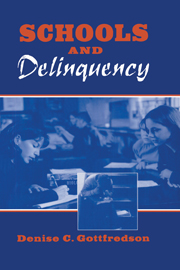Book contents
- Frontmatter
- Contents
- List of Tables and Figure
- Acknowledgments
- 1 School's Potential as a Location for Delinquency Prevention
- 2 School-Related Individual Characteristics, Attitudes, and Experiences
- 3 School Effects
- 4 Field Studies of School-Based Prevention: An Overview
- 5 Changing School and Classroom Environments: The Field Studies
- 6 Changing Student Personality, Attitudes, and Beliefs: The Field Studies
- 7 Lost in Translation: Why Doesn't School-Based Prevention Work as Well as It Should?
- 8 Where Do We Go from Here?
- References
- Author Index
- Subject Index
2 - School-Related Individual Characteristics, Attitudes, and Experiences
Published online by Cambridge University Press: 05 August 2011
- Frontmatter
- Contents
- List of Tables and Figure
- Acknowledgments
- 1 School's Potential as a Location for Delinquency Prevention
- 2 School-Related Individual Characteristics, Attitudes, and Experiences
- 3 School Effects
- 4 Field Studies of School-Based Prevention: An Overview
- 5 Changing School and Classroom Environments: The Field Studies
- 6 Changing Student Personality, Attitudes, and Beliefs: The Field Studies
- 7 Lost in Translation: Why Doesn't School-Based Prevention Work as Well as It Should?
- 8 Where Do We Go from Here?
- References
- Author Index
- Subject Index
Summary
What type of student engages in problem behavior? How does the school encourage or discourage the development of these characteristics, if at all? This chapter examines evidence from a variety of research traditions on individual-level correlates of problem behavior and attempts to identify which of the many correlates of problem behavior are also causes. It summarizes contributions from personality research and criminological theory on the stability of these individual factors over the life course, and constructs a model of the development of problem behavior during the schooling years. The chapter ends by discussing school's potential role in increasing or decreasing problem behavior.
Correlates and Antecedents of Problem Behavior
Persons who engage in one form of problem behavior are highly likely to engage in others: 59% of youths who have committed serious crimes have also used multiple drugs, compared with 19% among youths who had not committed these crimes (Elliott et al., 1989); school dropouts have four times as many police contacts as high school graduates (Elliott and Voss, 1974); among males who had used marijuana by their senior year, 44% had also had sexual intercourse compared with 17% for males who had not used marijuana (Jessor and Jessor, 1977). Risky sexual behavior is also highly correlated with antisocial behavior, smoking, alcohol use, and illicit drug use (Biglan et al., 1990). This “comorbidity” of problem behaviors is well established.
- Type
- Chapter
- Information
- Schools and Delinquency , pp. 25 - 61Publisher: Cambridge University PressPrint publication year: 2000



